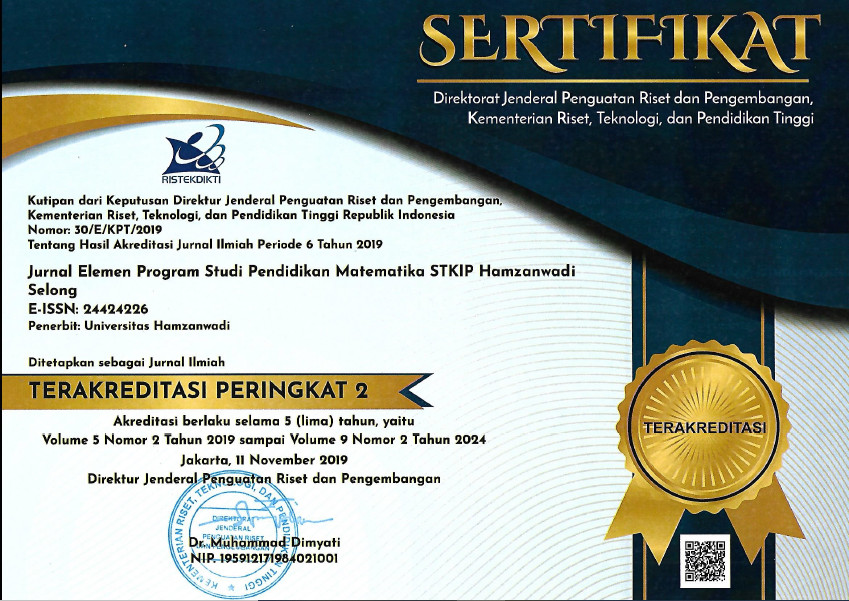LKS Berbasis Model Eliciting Activities untuk Mengetahui Kemampuan Pemecahan Masalah Matematika di Kelas VIII
DOI:
https://doi.org/10.29408/jel.v2i1.176Keywords:
Student Worksheet, Model Eliciting Activities, mathematical problem solving abilityAbstract
This study aims to determine the characteristics of Model Eliciting Activities a valid and practical, and determine the potential effect on the student worksheet for problem solving ability eighth grade students. The study resulted several characteristics of model eliciting activities which are including: (1) LKS developed customized with steps and learning the principles of Model eliciting Activities; (2) improve the ability of students LKS Model eliciting Activities related aspects, namely self-assessment, documentation and construk models share abilities and re-usability; (3) Each settlement problems in LKS, guidance is given on the wane; (4) Guidance is given less and less able to develop students' problem-solving abilities; (5) LKS Model eliciting Activities related to indicators of achievement of mathematical problem solving ability. Student Worksheet categorized as having potential effects on math problem solving ability of students who have a grade point average mathematical problem solving ability of 68.5, so the mathematical problem solving abilities 8.1 grade students includes both categories.References
Abdurrahman, M. (2009). Pendidikan Bagi Anak Berkesulitan Belajar. Jakarta: Rineka Cipta.
Akker, J.V.D. (1999). Principkes and Methods of Development Research. Dalam J.V.D Akker (Ed). Design Approaches and Tools in Education and Training. Dordrecht: Kluwer Achademic Publishers.
Chamberlin, S.A., & S.M. Mood. (2005). Model-Eliciting Activities as a Tool to Develop and Identify Gifted Mathematiciant. Journal of Secondary Gifted Education, 17 (1): 37-47.
Depdiknas. (2006). Pandua Penyusunan Kurikulum Tingkat Satuan Pendidikan. Jakarta: Depdiknas.
Dimyati & Mudjiono. (2009). Belajar dan Pembelajaran. Jakarta: Rineka Cipta.
Djaali & P. Mulyono. (2008). Pengkuran dalam Bidang Pendidikan. Jakarta: Gasindo.
Djamrah & S. Bahri. (2000). Guru dan Anak Didik dalam Interaksi Educatif. Jakarta: Rineka Cipta.
Gok, T., Silay. (2010). The effects Problem Solving Strategies on Students’ Acievement, Attitude and Motivation. 4 (1): 8.
Hamilton, E., R. Lesh, F., Lester, & M. Brilleslyper. (2008). Model – Eliciting (MEAs) as a Bridge Between Engineering Education Research and Mathematics Educations Research. ASEE,: 2
Jonnasen, D.H. (2004). Learning To Solve Problems. Pfeifer: San Fancisco.
Lambertus, A. Bey, M. Anggo, Fahinu, M. Sudia, & Kadir. (2014). Developing Skills Resolution Mathematical primary School Students. International Jurnal of education and Research, 2 (10): 2.
Lesh & Doerr. (2003). Model Eliciting Activities. http://id.scribd.com/doc/87325480/Model-Eliciting-Activities. Diakses pada tanggal 4 Desember 2014.
Modul Matematika. (2010). Teori Pemecahan Masalah Polya dalam Pembelajaran Matematika. http://masbied.files.wordpress.com/2011/05/modul-matematika-teori-belajar-polya.pdf. Diakses pada tanggal 11 November 2012.
Moore, T., and H.D. Dux. (2004). Developing Model-Eliciting Activities for Undergraduate Students Based On Advanced Engineering Content. Session F1A, 4 (10): 5.
Moore, T.J., R.L. Miller, B. Self, E. Hamilton, & L. Shuman. (2008). “Special Session – Model – Eliciting – Activities: Motivating Students to Apply and Integrate Upper – Level Content and Engineeringâ€. Session T3J: 1.
Nasution, N. (2007). Evaluasi Pembelajaran Matematika. Jakarta: Balai Pustaka.
Pittalis, Mousoulides, and Christou. (2009). Students’ 3D GeometryThinking Profiles. Lyon France: Proceedings of Cerme 6.
Posamenteir, A.S., & Krulik, S. (2009). Problem Solving In Mathematics. Corwin: United State of America.
Prastowo, Andi. (2014). Pengembangan Bahan Ajar Tematik. Kencana Prenadamedia Group: Jakarta.
Rosli, R., D. Goldsby, & M.M. Capraro. (2013). Assessing Students’ Mathematical Problem-Solving Skills. ISSN, 9 (16): 1.
Satori, D., & A. Komariah. (2010). Metodelogi Penelitian Kualitatif. Bandung: Alfabeta.
Shahbari, J.A., W. Daher, & S. Rasslan. (2014). Mathematical Knowladge and The Cognitive and Metacognitive Processes Emerged In Model-Eliciting Activities. Ijonte, 5 (19): 1.
Sophocleous, and Gagatis. (2009). Efficacy Believes and Ability to Solve Volume Measurement Tasks in Different Representations. Lyon France: Proceedings of Cerme 6. Sudijono, A. 1995. Pengantar Evaluasi Pendidikan. Yogyakarta: Rajagrafindo Persada.
The SERC Portal for Educator. What are Model-Eliciting-Activities. http://serc.carleton.edu//sp/library/mea/what.html. Diakses pada tanggal 4 Desember 2014
Tjalla, Awaluddin. (2013). Potret Mutu Pendidikan Indonesia Ditinjau dari Hasil-Hasil Studi Internasional. http://www.pustaka.ut.ac.id/dev25/index.php?option=com_content&view=artic e&id=2201:potret-mutu-pendidikan-indonesia-ditinjau-dari-hasil-hasil-studi-internasional&catid=75&Itemid=417 . Diakses pada tanggal 17 Januari 2015
Walle, V.A.V.D. (2006). Elementary and Midle School Mathematics. Dalam Segara, G., dan L. Simarmata (Ed): Sekolah Dasar dan Menengah Matematika Pengembangan Pengajaran. Jakarta: Erlangga.
Wardhani, Sri. (2010). Teknik Pengembangan Instrumen Penilaian Hasil Belajar Matematika. Yogyakarta: Pusat Pengembangan dan Pemberdayaan Pendidik dan Tenaga Kependidikan (PPPPTK) Matematika.
Wessels, H. (2014). Levels of Mathematical Creativity in Model-Eliciting Activities. ISSN, 1 (9): 4.
Yiyu, S., and C.K. Chang. (2009). What Did Thaiwan Mathematics Teachers Think of Model-Eliciting Activities and Modeling: 1.
Zulkardi. (2002). Developing a Learning Environment on Realistic Mathematics Education for Indonesian Student Teachers. Doctoral dissertation. Enschede: University of Twente.
http://www.google.com/url?sa=t&rct=j&q=&esrc=s&source=web&cd=1&ved=0CB8QFjAA&url=http%3A%2F%2Feprints.unsri.ac.id%2F615%2F1%2Fthesis_Zulkardi.pdf&ei=-oHRVKznDIrn8gXquoDIAQ&usg=AFQjCNFpM3ceZMSiBCL2VGjBtv46IkLiVQ&sig2=uI4UPxeS_hccfH-sZ8Yeog&bvm=bv.85142067,d.dGc. Diakses tanggal 8 Desember 2014
Downloads
Published
How to Cite
Issue
Section
License
Authors who publish with the Jurnal Elemen agree to the following terms:
- Authors retain copyright and grant the journal right of first publication with the work simultaneously licensed under Creative Commons Attribution-ShareAlike 4.0 International License (CC BY-SA 4.0).
- Authors are able to enter into separate, additional contractual arrangements for the distribution of the journal's published version of the work (e.g., post it to an institutional repository or publish it in a book), with an acknowledgment of its initial publication in this journal.
- Authors are permitted and encouraged to post their work online (e.g., in institutional repositories or on their website) prior to and during the submission process, as it can lead to productive exchanges, as well as earlier and greater citation of published work.
Jurnal Elemen is licensed under a Creative Commons Attribution-ShareAlike 4.0 International License






